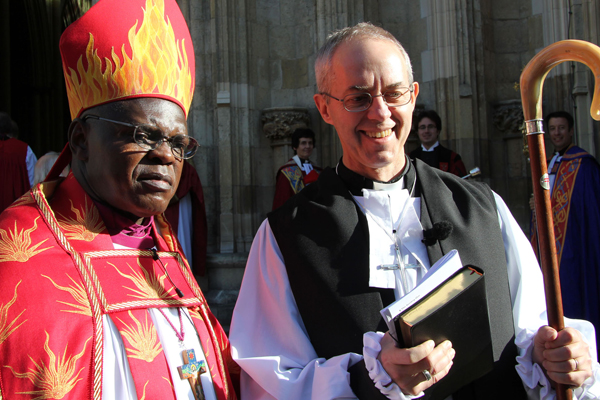
The first same-sex weddings in the United Kingdom have been taking place in recent days after gay marriage became legal in England and Wales late last week.
Archbishop of Canterbury Justin Welby said on Friday night that the Church of England would now drop its opposition to same-sex marriage, as Parliament had spoken. “The law’s changed; we accept the situation,” he told the BBC.
Damian Thompson, a columnist for the Daily Telegraph recapped on Saturday, “The first British gay weddings today face the Church of England with a perfectly simple question to which it can only reply with embarrassed throat-clearing. Do we go along with this or not?” Near the article’s conclusion he offers this prediction:
As of today, pro-gay clergy will begin to unpick Cameron’s “triple lock” banning parishes from holding gay weddings; during the next Parliament it will cease to exist. Priests who want to marry same-sex couples, or indeed marry their own gay lovers, will just do it. Anglo-Catholic and Evangelical parishes that reject the whole notion won’t be forced to host such ceremonies, but both these wings of the C of E are moving in a liberal direction, and in the long run demographic change will finish the job.
It’s hard to overestimate the weakening effect this will have on the central structures of the Church. The General Synod’s deliberations will be rendered irrelevant. The fiction of the “Anglican Communion” will be abandoned. Conservative provinces in Africa will repudiate the C of E; the last Lambeth Conference’s disciplinary action against the anything-goes American Episcopal Church will cease to mean anything.
In the 1990s, when I started reporting on Anglican affairs, gay marriage was regarded as a non-negotiable horror by most clergy and churchgoers. The shattering of that consensus has happened far more quickly than even the most optimistic Christian gay campaigners thought possible.
And if the centre cannot hold, one has to ask: what is up for negotiation next? Belief in an afterlife? The divinity of Jesus of Nazareth? After today, one thing is uncomfortably clear: the Church of England has lost the power – and even the inclination – to draw a line in the sand.
But therein lies the fundamental problem–ever assuming we had the right to draw the lines in the first place.
- God is the Creator of all things (Gen 1-2; Psa 33:6)
- He is the Giver of all good things (James 1:17)
- He is the Owner of all things (Psa 50:10)
- He is the Upholder of all things (Heb 1:3)
- He is the Source of our spirits (Gen 1:27; Eccl 12:7)
- He is the Founder of the nations (Acts 17:26-28)
- He is the Ruler of all peoples (Psa 22:28; Jer 10:7)
- He is the Judge of every person (Rom 14:10-12)
- All things were created for him (Col 1:15-17)
- He is the ultimate Definer (Eph 1:3-14)
He has put all things under the feet of Jesus Christ and given him as head over all things to the church, which is his body (Eph 1:22-23). As the only one who may rightfully claim “all authority in heaven and on earth” (Matt 28:18), Christ has already drawn the lines. He has done so in solid rock (Matt 7:24-27), not in the ever-shifting sands of popular culture or historical “progress.” The crowds who originally heard him “were astonished at his teaching, for he was teaching them as one who had authority” (Matt 7:28-29).
It is when we fail to properly respect that ultimate authority and act as if we ever had the right to “draw the lines in the sand” that we find ourselves square in the midst of an “embarrassed throat-clearing” conundrum.
“We’ve compromised, innovated, and adapted in the past, why not now?”
At that point, it’s not hard to see why a secular newspaper like the Telegraph would print, “The Church of England has lost the power – and even the inclination – to draw a line in the sand.”
Thompson rightly asked, “What is up for negotiation next? Belief in an afterlife? The divinity of Jesus of Nazareth?” He does so because this is the logical cost. Lack of respect for ultimate authority is erosive in its very nature. When we go beyond what is written (1 Cor 4:6) and claim authoritative territory that is not ours, we begin building on sand. Self-centered culture is more than capable and willing to put pressure on that sand. Given enough time, the sands begin to shift and once the landslide starts, there’s no stopping it.
The antidote is the rock of God-shaped respect for authority. New Testament Christians are not immune to the seeds of the whirlwind that the Church of England is reaping. Will we recognize God’s authority, submit to it, and build our lives on it?